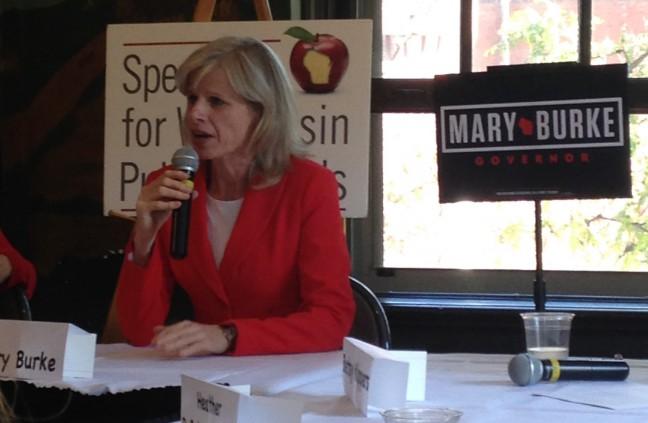A small group panel quizzed Democratic gubernatorial candidate Mary Burke on her views on education in Wisconsin, the school choice voucher program and student financial aid and debt at a Monday roundtable.
Lily Eskelsen Garcia, the newly elected president of the National Education Association and first Latina women to head the organization, joined Burke for the Women in Leadership: Education Roundtable at Memorial Union Monday afternoon.
The panel consisted of Sue Howe, a former Monona Grove high school teacher; Heather DuBois Bourenane, a Sun Prairie parent and grassroots organizer; and Briana Schwabenbauer, a student in University of Wisconsin’s School of Education.
“Education is one of the most important issues in this race,” Burke said. “Gov. Walker and I have two very different perspectives on public education and these are things that I talk about everyday as I travel throughout the state.”
Howe and DuBois Bourenane asked Burke to give her opinion on private voucher programs, referring to Walker’s proposal to expand School Choice initiatives by raising taxpayer support that could come out of state support for public schools.
Burke said people should turn away from the ideological warfare of private versus public schooling.
“Let’s talk dollars and cents then,” she said. “The cost of a statewide expansion of vouchers that is not income based is $1.2 billion dollars a year and that’s assuming only 10 percent of public school students enroll in the program. That is $2.8 million dollars per school district in Wisconsin and not many schools can afford losing that amount of money.”
Schwabenbauer, the UW student on the panel, expressed a passion for teaching, but also addressed her concern about entering a career in education.
As both a student and a future teacher, she asked Burke about the impact of rising student loan debt and the increasing cost of a college education.
Burke said she put forth several concrete proposals. Firstly, she proposes making student loan payments tax deductible.
Secondly, she mentioned increasing the tuition and fee tax deduction while in school. She also proposed increasing the income limit on which those payments are tax deductible as a way to reach out to higher income families with more than one child receiving higher education.
Burke also said she would implement a student loan refinancing authority. Many people across the state with outstanding student loans would then be able to refinance those at a lower rate, she said.
If people are paying interest between 6-8 percent, but the state can borrow at 3 percent it makes sense to allow people to refinance that loan, she said.
“Every dollar that that person is saving can be spent in the economy,” Burke said. “I’ve heard the stories of young people delaying things like buying a car or buying a house because they’re strapped with student debt.”
Those are things she said she would do immediately, but she also said she would increase the amount of financial aid that is allocated in the state budget. Burke said right now, under Walker, about 41,000 people are eligible for need-based aid who aren’t receiving it.
Walker froze tuition costs for two straight years and has expressed an intention to continue to do so, and Burke said his approach puts too much pressure on the university.
She said Walker’s approach would lead to cuts of expenses that could affect the availability of course curriculum or the ability to hire faculty.
“When students think about tuition freezes as a long-term basis as a way to hold down higher education costs, they have to understand what’s going to come out of the quality of education that they’re getting right now,” she said.


